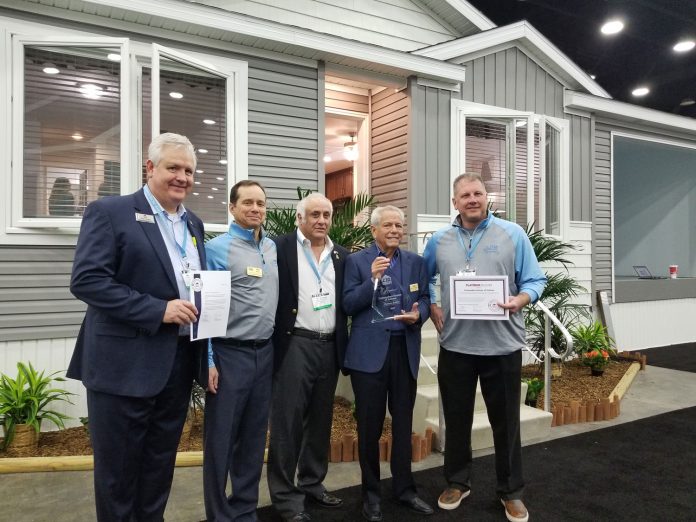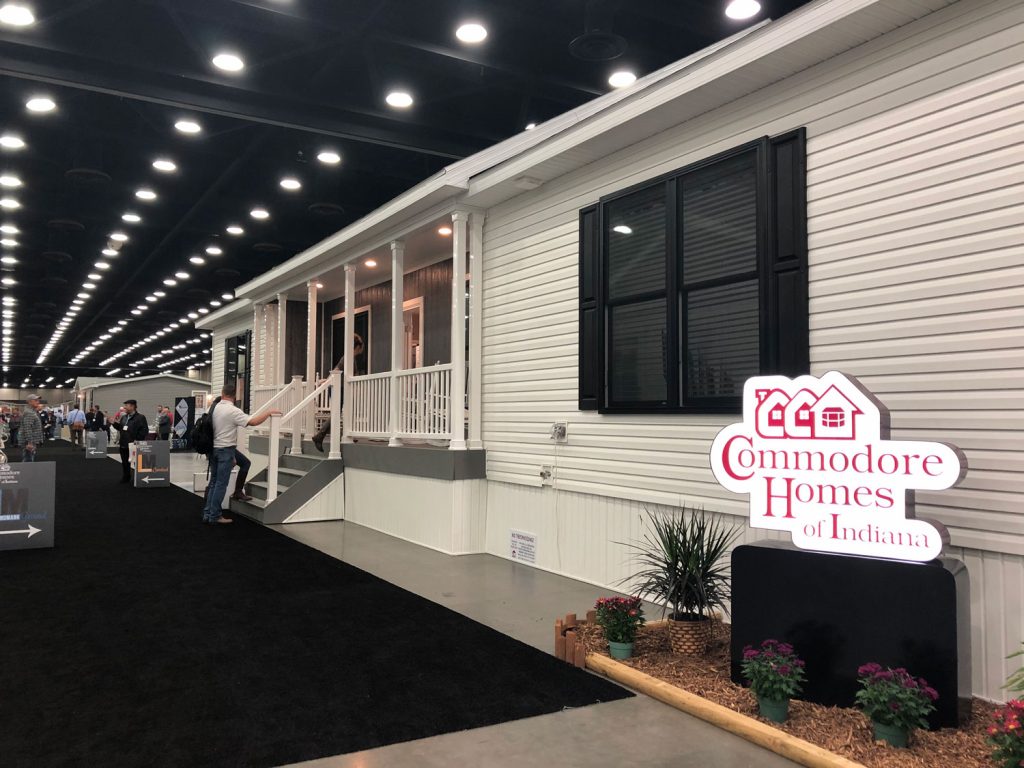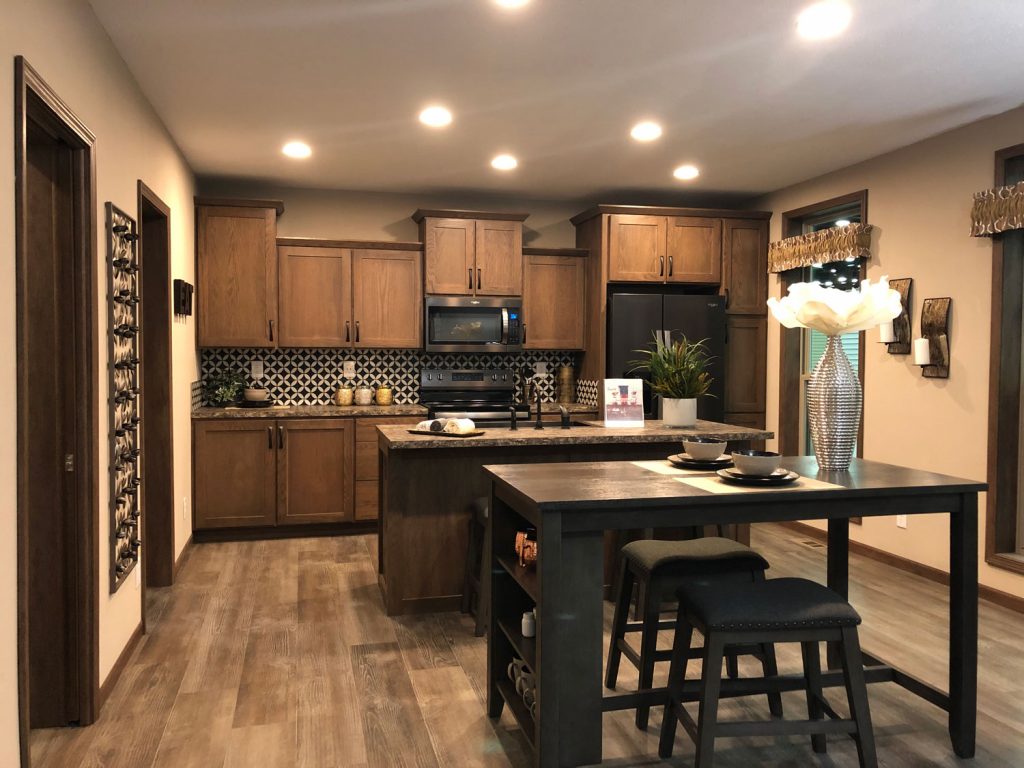
The Commodore Corporation and its affiliated brands are mainstays among builders that display model homes at manufactured housing trade shows. However, Commodore owner and CEO Barry Shein tends to shy away from the spotlight, pleased that his companies and homes get the attention.
MHInsider magazine managed to catch up with the elusive executive for a short conversation during his commute between company headquarters in Goshen, Ind., and the home building facilities in Pennsylvania.
‘A little Bit Different’
Shein never wanted to operate like the others. Commodore and its brands — Colony, Manorwood, MidCountry, Pennwest, and R-Anell — build 6,800 floors per year and provide those manufactured homes to retailers and homebuyers in the upper Midwest to the east and up the Atlantic seaboard.
“Yes, our business model is a little different,” Shein said. “We always want to do something a bit different than the public companies. We do what they choose not to do. We stay away from the really low entry-level and we stay away from the high-end custom homes. We look at the meat of the market.
“Our specialty is in engineering, allowing us to customize efficiently,” he said. “In house we do all of the production prints, this creates a great amount of flexibility and option packages for our customers.”
In our effort to keep the design and construction of homes keyed in on the market served, Commodore leadership asks each plant to operate largely on its own.
“We give a lot of responsibility and authority at the plant level,” Shein said. “The home office is here to serve the plants, not vice versa. We want each one of the plants to be an entrepreneurial effort.”

Investing in Automation
Commodore Corporation picks its spots to upgrade machinery and advance production. It’s most likely to expand with an existing factory, and turn to interior upgrades that can be phased over time, rather than build a new factory.
It doesn’t take actuated overhead infrastructure to more effectively move a home down the line.
The use of CNC machines, for instance, allows Commodore to produce a better countertop in less time, with less waste, and with a greater amount of consistency from home to home. CNCs and gantry systems provide automation at a price tag that’s far less than the price tag for a fully automated factory.
“You can use a machine instead of a worker stooping over, bending their back with a nail gun,” Shein said of the gantry implementation. “It’s not anything that’s fancy, but it’s very effective.”
Looking Back on His Career
Shein graduated from the University of Miami in 1961 with a degree in accounting. He worked for the Internal Revenue Service for five years, and also served in the Army Reserves. He spent some time at Griffen Industries, a fabricator and provider of floor coverings, and moved to TrammelCrow, one of the largest commercial developers in the country.
During his tenure at TrammelCrow, Shein served as controller and vice president of the Atlanta market, which involved oversight of projects that included Cumberland Mall and Riverbend Apartments, now called Walton on the Chattahoochee.
In 1977, Shein went to work for Equity Financial and was involved with Mobile Home Communities, now Equity LifeStyle Properties, run by the iconic Sam Zell.
“He was known at that time as the ‘Grave Dancer’, and that’s kind of stuck because he bought a lot of distressed properties,” Shein said of Zell. “He is a genius. I imagine the greatest deal maker I’ve known. He’s really a down to earth guy, he’s really easy to talk to. I will always remember and appreciate the time I spent there.”
Enter Commodore Corporation
Shein worked with Zell for 10 years. It was during that time that Commodore became available.
“With Zell, I was primarily in charge of an office building portfolio and the mobile home portfolio,” Shein said. “Commodore borrowed money from one of Zell’s companies Great American Mortgage, and actually defaulted on that loan.”
Zell’s team, including Shein, gathered enough people and funding to carry Commodore into bankruptcy and attempt a restructuring. It was only a matter of who was going to run the operation.
“I remember ‘Hey, Barry, you run the mobile home portfolio, you must be the guy.’ I became chairman of the bankrupted company and reorganized. We released all of the top management and brought in a new president and I stayed in Chicago as chairman. That was at the end of 1987.”
Commodore wasn’t really an active part of the Zell group of companies; it was something they obtained almost by accident. The company was restructured to save production jobs and to keep that pipeline of homes to market.
“By then, my life had changed a bit. I married, and didn’t want to travel as much. I asked Sam if I could do something else. He offered half of Commodore, and I bought it. I bought the second half in 1992.”

Change and Re-Growth
Commodore at the time of the bankruptcy had 20 plants. Shein said “We ate off the seed corn”, indicating desperate measures were at hand to save the company.
“We ended up with five plants,” he said. “We expanded Goshen and closed Syracuse, Ind. We built the new plant in Shippenville, and then we built the Pennwest plant,” he said. “We also closed another archaic plant in Danville, Va., and we bought R-Anell out of bankruptcy.”
During bankruptcy and the years immediately following, Commodore built all HUD-code homes. Now the mix between modular and manufactured is even.
Commodore has two plants that are all mods, R-Anell and PennWest; Commodore of IN is primarily Mods. Midcountry Homes, Commodore Homes of Pennsylvania and Colony Factory Crafted Homes plants are primarily HUD.
“We’ve made our money, and we’ve grown our company staying under the radar. We don’t want to challenge the gorillas. We don’t have a huge corporate staff,” Shein said. “We have a group of people who run this as a family company. We care about our people, and our relationships with communities, dealers and builders.”
Building Relationships One Home at a Time
Commodore Corporation pays special attention to its vendors, dealers, and home buyers. They build each home knowing the importance of the purchase to the homebuyer. They strive to have Commodore’s reputation for quality homes at a fair price be second to none.
“We always want to build a better house. Not a more expensive house, but a better house. That’s our mantra,” he said. “And all of the other stuff matters, too. I am very proud of our website. We’ve put a lot of time and attention into making it user friendly.
“We think sometimes the millennials might know as much about our homes as our dealers by the time they go in to actually see a home,” Shein said. “And that’s a good thing.”
Commodore has been blessed with big-time talent, Shein said.
Chief Operating Officer Bob Bender is the public face and future of the company. “He will take Commodore to a whole new level,” Shein said of Bender. “I have full confidence in that.”
Senior Vice President of Marketing and Sales Don Strick and Senior Vice President of Engineering Nader Tomasbi are integral to the company’s success, he said.
As for Shein, he winces at retirement plans.
“I guess I’ll retire when Bob shoves me out the door!” Shein exclaimed. “In the meantime, I am shifting a lot of the responsibility in giant chunks to Bob.”
Company Culture
Shein said the company’s top-flight team organically built the culture and continues to intentionally drive it by nurturing and advancing core values.
“This is all fairly new, and it’s something we came to,” Shein said of the core values. “A decade or so ago, we had a mission statement like everyone else.”
Commodore’s Core Values
- Relationships matter
- Create teamwork to win
- Integrity
- Trust
- Curious to be better
- Diversity of thinking and debate
“That’s what drives us,” Shein said. Commodore Corporation pays membership dues and provides sponsorship support to both MHI and MHARR, as well as to the independent Manufactured Housing Buying Group run by Dave Roberson.
Shein and his wife Cari get great pleasure by giving back to the community including to public and private education and other local charities as well as the South Bend Symphony.












